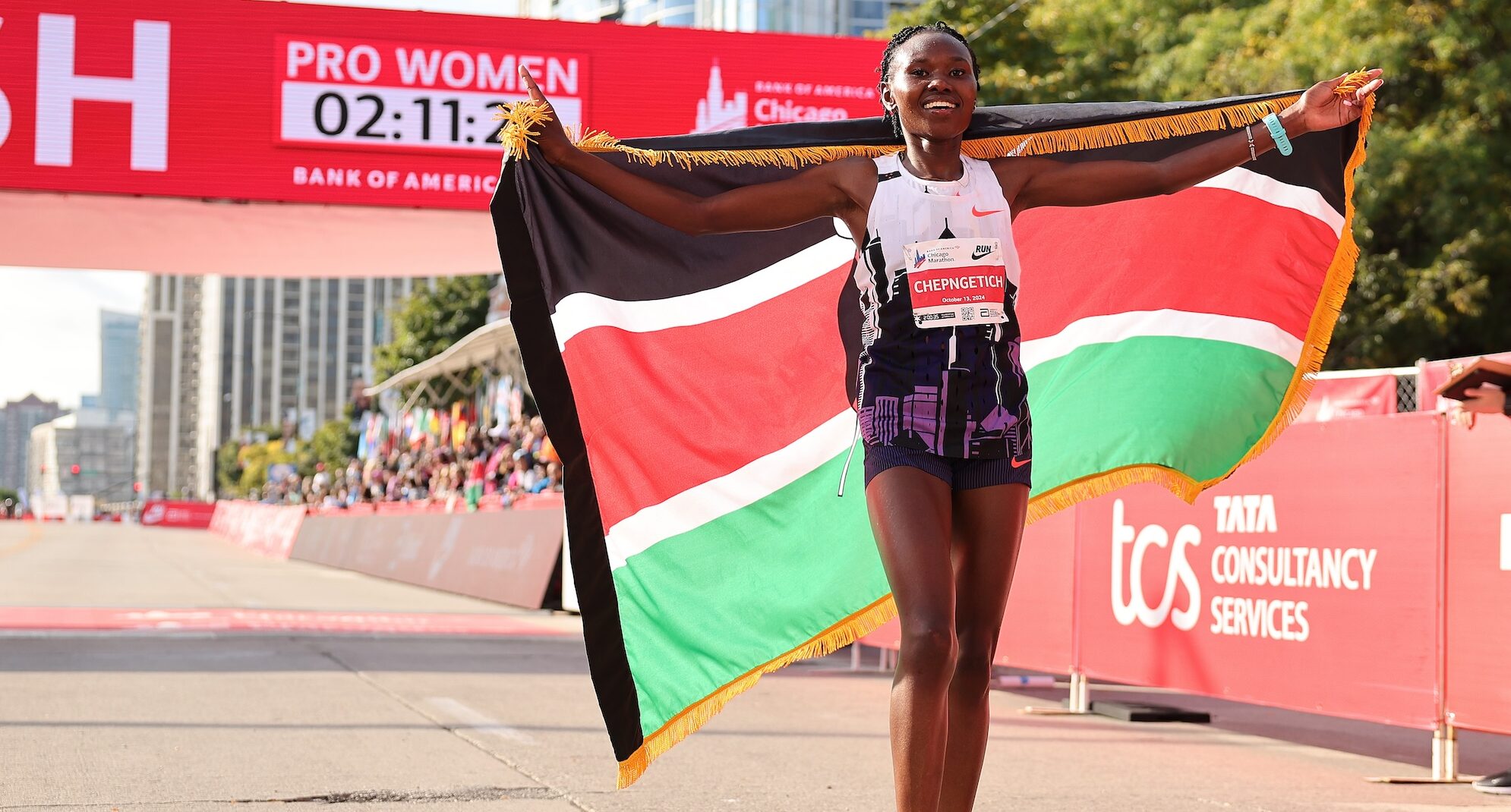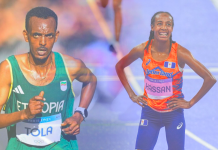Chicago was dubbed ‘the windy city’ not for meteorological reasons but for the propensity of its citizens for hometown promotion. As much hot air as hold on to your hats.
Regardless, it has been blowing a gale since Ruth Chepngetich took a sizeable chunk out of the world record in winning this year’s Chicago marathon, becoming the first woman under 2:10:00 when she crossed the line in 2:09:56.

Amazing. Nearly everyone agreed on this one point. Beyond that, however, people galloped off in all different directions. The two extremes could be summarised as “too good to be true: therefore, dodgy” and “let’s celebrate an exceptional performance until when and if we know better.”
There hasn’t been this much debate about a world record since Florence Griffith Joyner ran 10.49 for 100 metres at the 1988 US Olympic Trials with the wind reading given as 0.0 metres per second despite tailwinds of over 5m/s being recorded at the same time on the infield triple jump runway just a few metres away.
Amby Burfoot and Toni Reavis are two observers and chroniclers of the US running scene who have been around for as long as your columnist has been, perhaps even longer. They also typified the various reactions to Chepngetich’s performance.
The agreed stats on Chepngetich are age – 30; number of marathons – 15, for 13 finishes of which nine were wins; world champion in the brutal Doha 2019 conditions; three-time major championships winner, all in Chicago, and second place in 2023. Pre-Chicago 2024 her personal best was 2:14:18 hence the world record was a 4:22 improvement.

The more sceptical Burfoot saw those numbers as indicating a well-established marathoner from whom such a late-career time improvement was suspicious in itself.
“Mature runners don’t improve that much,” he wrote in a piece which appeared in edited form on the Runner’s World website.
Burfoot seemed to argue further that the appearance of something being amiss was evidence that something was indeed seriously amiss. Drawing from his lengthy reportage on US running he cited the infamous case of Rosie Ruiz who jumped into the 1980 Boston marathon and crossed the line as “first” woman.
“I was at the Boston Marathon finish line when Rosie Ruiz came in huffing and puffing, breaking the tape. We runners all knew immediately that she was a fraud. We had no proof. But we knew. Perhaps it was because we were marathoners ourselves, and we know our sport.
“It took the Boston Athletic Association, which runs the Marathon, more than a week to disqualify Ruiz; but my friends and I knew the truth immediately. We had to stay mostly quiet in that interim period because it’s not cool to judge someone without evidence. But we knew.”
At the risk of over-simplifying, such reasoning justified being highly suspicious of Chepngetich and her 2:09:56, Burfoot concluded. He – and many others who raised an eyebrow and a suspicion or two – believe that the time to speak out is now, not when and if further information comes to light.

Toni Reavis, on the other hand, argues that while questioning of any record performance is justified cynicism should not be “the default reaction.”
“No record in athletics can be free of scepticism considering the industrial level of PED use that is uncovered, seemingly, every other Tuesday,” Reavis wrote in his initial take on Chicago.
“Still, though understandable, cynicism should not be one’s default reaction.
“To maintain any allegiance to the game, to follow it with any interest at all, we have to celebrate each record at face value. Just as rabid fans have to acknowledge some records to be ill-gotten, cynics must accept that many special runs are exactly as they appear, above reproach.”
On this one, I sit at the Reavis end of the spectrum. Spectacular as the performance is, it should be accepted at face value until shown to be otherwise.
Burfoot’s allusion to Rosie Ruiz is not a valid comparison, in my view. It’s one thing to look at someone who palpably is not a runner and conclude they didn’t run the Boston marathon (or at least, not all of it) and another to look at someone who just as palpably is a runner and conclude they didn’t legitimately run that fast.
World records are outlier performances by outlier athletes and don’t conform with the “rule”, oft-quoted in recent days, that there is a 10-11 percent difference between male and female records. That may be so in the long run, but it is ‘true’ – best fit, actually – over the whole sample of records kept, not of each record individually. In women’s distance events, we have at most 40 years history being compared with men’s performances since Spiridon Louis.

The same is true of every other comparison so far advanced in arguing about the validity of Chepngetich’s performance. Mature athletes don’t improve late in their careers? Most don’t, it’s true, but some do. Just as it is also true that most athletes improve on their early career performances but a few run their fastest times early then spend a long career running well without ever again achieving a personal best.
On that, it may be revealing to look at Ruth Chepngetich’s performances in the past couple of Chicago marathons, which she seems to have made her peak race of each year. Last year, she zoomed out hard, running the first 25km at sub-2:12 pace before Sifan Hassan out-duelled her to win, 2:13:44 to 2:15:37.
A year earlier, on the way to winning, Chepngetich opened with a 15:11 first 5km, reached halfway in 65:44 before slowing to 68:34 for 2:14:18. In her first win, a year before that again, she ran 67:34/74:57, so she went for it each time. Maybe 2024 was just the year Ruth Chepngetich got it magnificently right.
Let’s hope so
























